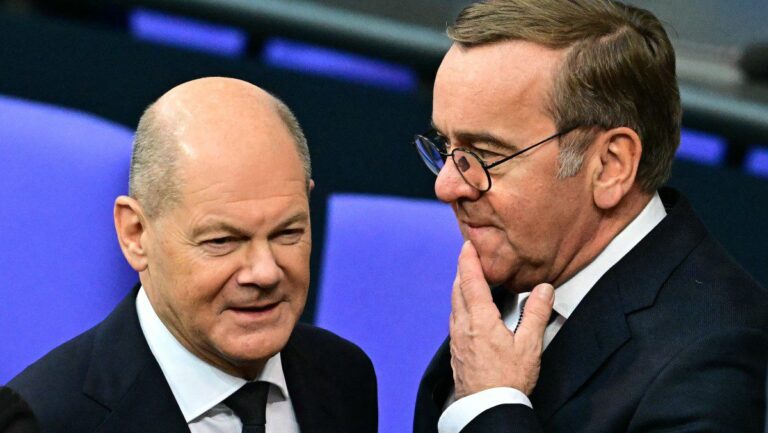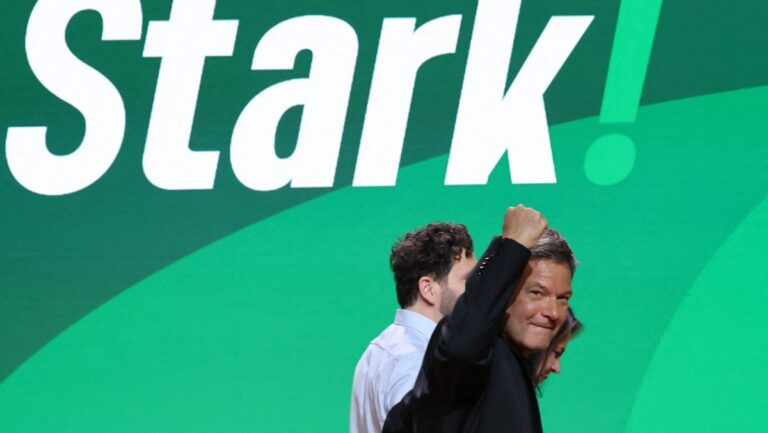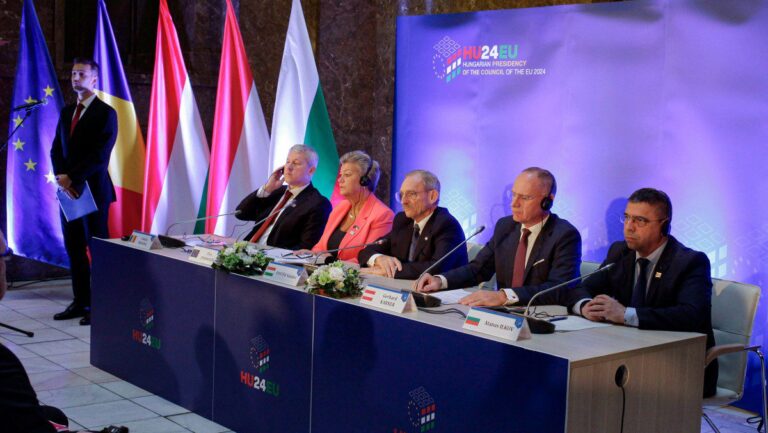EU leaders now seem ready to take direct control of their external security. The leaders of Germany, France, and Poland are emphasising “strategic autonomy,” to complement their reliance on existing North Atlantic structures.
This unlikely trio of EU countries have begun positioning themselves as the de facto leaders of Europe’s security revival. Reinvigorating the Weimar Triangle—a three-decades-old but for the past years largely empty alliance—Polish PM Donald Tusk held a quick meeting with French President Emmanuel Macron in Paris, before travelling to Berlin on Monday, February 12th, to discuss security cooperation with Chancellor Olaf Scholz.
Demonstrating that cooperation within the moribund Weimar Triangle is going to restart, each member country has already held a three-way meeting attended by foreign ministers, just outside of Paris on Monday.
The backdrop to these talks is U.S. ex-president Donald Trump’s “reckless” comments about NATO members who fail to contribute, spreading panic in Europe. Only eleven out of the 31 NATO allies have met the organisation’s 2% defence spending requirement in 2023, supporting Trump’s assessment—however undiplomatic—that Europe is taking U.S. protection for granted: ten years after the Russian annexation of Crimea and two years after the full invasion of Ukraine, many EU militaries still run mostly on mottos and promises.
While the desire to snap out of the general apathy is still just days old, Trump’s remarks, and the increased likelihood of his re-election, are prompting EU leaders to step up their security game.
“The close cooperation between our three countries—Germany, Poland and France—is very important to all of us,” Scholz said during Monday’s joint press conference with Tusk.
That is why I am also proposing that the Weimar Triangle be given new momentum at the level of the heads of state and government in order to develop new impetus for the European Union.
The Polish premier used even more dramatic language when describing the need for the Weimar Triangle to take a leading role in Europe’s security architecture.
“We will be respected in all the capitals of the world if we believe that the European Union can be a power not only of civilization, economy, and science, but also a military power,” Tusk said.
Polish security was its highest priority well before Tusk’s liberal Civic Alliance took over the government from the conservative Law and Justice (PiS). It’s been over a year since ex-PM Mateusz Morawiecki pledged to spend 4% or more of the country’s GDP on defence, initiating several high-profile modernisation programmes that put Poland on course to become the next military superpower in Europe.
While Tusk is merely building on his predecessors’ work, the revived Weimar Triangle could pull in Europe’s two largest economic and industrial heavyweights alongside him. France and Germany are boasting the EU’s most capable defence industries, yet none of them reached the 2% defence spending last year. France was close at 1.9%, but Germany limped well behind with just 1.6% of its GDP.
“Every minute counts to prepare the Europeans to absorb the shock of a scenario such as described by Donald Trump,” French Foreign Minister Stéphane Séjourné said afterward. “We need a second life insurance, not against NATO, but in addition. That means working on NATO’s European pillar, building a Europe of defence, and buying from our industries as Europeans.”
According to his German counterpart, Annalena Baerbock, “cooperation had never been as important since the birth of the Weimar format.” The German foreign minister added that the three countries “don’t have the same perspective on defence,” but the important thing is that they are pulling “in the same direction.”
It’s true; the reason there wasn’t any grand strategy unveiled was that France and Germany have very different views on what a pan-European security architecture should look like.
Macron is using the momentum to push for his age-old idea of “strategic autonomy,” a sort of parallel structure within NATO but even more integrated, that could even include the EU’s very own aircraft carrier fleet or nuclear defence shield. On the other hand, Berlin—wary of surrendering too much initiative to Paris, the EU’s last remaining nuclear power—would like to keep things less integrated and improve industry output and cooperation instead.
At the same time, Brussels is also piggybacking on the tremors Trump’s remarks caused by pushing its idea of a centralised defense union under its command complete with a set of newly proposed funding mechanisms and a giant €100 billion joint defence fund.
“We need a defence union and we need to spend more on defence,” European Parliament President Roberta Metsola said on Monday, stressing that Europe needs to “strengthen our defence industry and get practical about our strategic independence.”
So far, however, many countries have been sceptical about signing up for this approach, even if they are in support of strengthening Europe’s collective security. Joint procurement might be easier than individual defence investments, but it also means Brussels is controlling the cash pot.
The idea of a European army under EU command is a growing concern among the more sovereigntist member states, and for good reason. There is a huge difference between strengthening your own capabilities while cooperating with others and submitting to an increasingly federalized military structure.
Nevertheless, we might see a strategic intertwining of the interests of Brussels and the Weimar Triangle soon. Proof of this might be one outcome of Commission president Ursula von der Leyen travelling to Paris on Tuesday to discuss security with President Macron.





